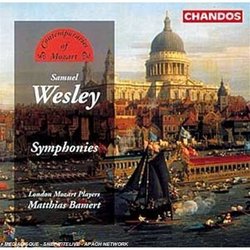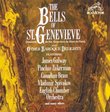| All Artists: Samuel Wesley, Matthias Bamert, London Mozart Players Title: Wesley: Symphonies (London Mozart Players) Mathias Bamert Members Wishing: 0 Total Copies: 0 Label: Chandos Release Date: 7/25/2000 Genre: Classical Style: Symphonies Number of Discs: 1 SwapaCD Credits: 1 UPC: 095115982327 |
Search - Samuel Wesley, Matthias Bamert, London Mozart Players :: Wesley: Symphonies (London Mozart Players) Mathias Bamert
 | Samuel Wesley, Matthias Bamert, London Mozart Players Wesley: Symphonies (London Mozart Players) Mathias Bamert Genre: Classical |
Larger Image |
CD DetailsSimilarly Requested CDs
|
CD ReviewsMere Symphonic Antiquarianism, This Disc's Music, but Well R Gerald Parker | Rouyn-Noranda, QC., Dominion of Canada | 08/10/2006 (4 out of 5 stars) "Samuel Wesley was a member of the numerous clan of composers of Anglican curch music, Methodist and Anglican-friendly hymnody (notably Charles Wesley), and one exponent of the Arminian theology (the famous John Wesley) that has led to the rise of modern sectarianism. Samuel Wesley (not to be confused with his [...] son, Samuel Sebastian Wesley, a more important figure), is a composer of much interest for the sake of his choral and organ works, but whose symphonies, especially considering the times of their composition, are of rather tediously faceless and stylistically retrograde compositional quality. The printed notes that come with this CD make much of Wesley's use of form, but, truth be told, the music with which Wesley fills the formal outlines is of only scant interest, too formulaic and tepid to stir up much interest except among antiquarians.
Of these symphonies, the one in D major ("Sinfonia obligato" of 1781) is something of a "sinfonia concertante", including among the highlighted instruments the organ (playing genuinely solo music, not mere continuo filler), which makes that work automatically of interest to fanciers of that keyboard instrument. The only symphony that compels true musical interest, and even at that to a rather pallid degree, is the last one in B-flat major of 1802. which has a richer orchestration, somewhat greater length, and more musical heft than the slighter earlier symphonies. The performances are about as good as such routine music can be said to merit, and the London Mozart Players really do play very well. However, it would have helped if the conductor, Matthias Bamert, had brought more legato to the phrasing of the fast movements as well as more expectably to the slower ones. The chugging and churning do not help to make a case for music that really has too little intrinsic melodic profile, which tends to wilt what meager measure there is there is of that character in Wesley's symphonies when the phrasing is obscured by so much détaché articulation. However, Bamert does not indulge in this so excessively as some other conductors among his contemporaries more brutally do, so, in the final consideration, one must lay the blame for the music's facelessless at the foot of the composer himself, not at the collective feet of the conductor and of his players. This is a good and conscientious effort at recording by-ways of the orchestral repertoire, but the music lover is advised to become acquainted with Samuel Wesley's choral and organ works before delving into this orchestral music. " |









